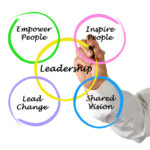
by MICHAEL MINK
President Dwight D. Eisenhower, also a five-star general, said effective leadership is like a string: Pull the string, and it follows wherever you wish. But push it and it goes nowhere.
Reaching even a top leadership position, though, doesn’t mean the journey is complete. Executives evolve by consistently improving their leadership skills.
Effective leadership is the blending of many skills including communication, motivation and empathy.
However, “You can’t make changes as a one-off,” said Chris Lewis, founder of Team Lewis, a marketing consulting firm. “It needs to be embedded as part of a routine. Excellence is not a single act. Excellence is a habit.”
Set High Expectations For Effective Leadership
Winning leaders are not passive. They exert pressure in a positive way to get people to act and commit to the right path, said Sarah Dalton. Dalton is a partner at Conchie Associates, a talent assessment and development firm.
“Talented leaders agitate for change, provoke thinking and never settle for average outcomes,” she said “That drives commitment and engagement.”
Hall of Fame basketball coach Phil Jackson was famous for being blunt with players. He’d even call them out in the media to make them uncomfortable. Jackson not only won 11 NBA titles, but earned the loyalty of his players, including such all-time greats as Michael Jordan, Shaquille O’Neal and Kobe Bryant.
Connect With People
The most effective leaders establish powerful followership through purposeful and ethical behavior, Dalton said.
Simply, “They care and have concern for those they lead,” she said. These leaders strike a balance between getting close to their people while never compromising objectivity when evaluating performance, she said.
Spark Winning Ideas Within Yourself
Leaders will not have the right creative energy if they fill their daily calendars from start to finish, Lewis said.
He recommends asking yourself this key question: “Where are you and what are you doing when you get your very best ideas?”
Three factors stand out in the majority of responses, Lewis has found: First, leaders are usually not at work when the best ideas come. Second, they’re often doing personal activities they enjoy.
The third factor is most telling of all: “They’re not trying to come up with ideas,” Lewis said. “This tells you that your best thinking is within you.”
Listen Carefully — To You
Make time to listen to your inner voice when working to become a more effective leader.
“The soul speaks softly,” Lewis, the co-author of “The Silent Rebellion: Becoming a Modern Leader,” said. “You have to be still for long enough to listen. The connection between excellence and solitude is clear in all great philosophical writings.”
But you don’t have to be St. Thomas Aquinas to improve your thinking, he says. You just need to clear some space. Go for a walk with no headphones on. Do some manual work. Get out into the countryside. Help others.
Value Talent And Intangibles Over Tenure For Effective Leadership
As a leader, you cannot do everything in a vacuum. You do your job better when you surround yourself with valuable people.
When looking to make your team, remember tenure and academic achievement is not synonymous with talent, said Barry Conchie, the founder and president of Conchie Associates.
“We’ve lost count of organizations specifying that 10 years or longer of prior experience is required for a leadership role,” he said. “What does that mean? If we assessed a candidate with high talent to succeed, but they only had seven years of experience, would you pass over their application.
Set A Course And Engage
The best leaders don’t just stop after rigorously setting goals; they apply a laser-focus to accomplishing them, Dalton said. She and Conchie wrote “The Five Talents That Really Matter: How Extraordinary Leaders Drive Extraordinary Performance.”
Focusing just as hard on completing goals as coming up with them in the first place helps leaders “anticipate problems and see opportunities rather than waiting to be overwhelmed by them,” she said.
Empower Your People
Ego and vanity lurk behind many leaders, Lewis said.
“The modern leader puts the team ahead of themselves,” he said. “Modern leadership is less about the ‘leader’ and more about the ‘ship.’ “
Modern leadership must give away power, not concentrate it. “That not only puts colleagues in a position of power and responsibility, it encourages them to see a bigger picture.”
The Taoist Lao Tzu wrote “A leader is best when the people barely know he exists. When the work is done, his aim fulfilled, the people will say, ‘We did it ourselves.’ “
Source: Investors.com



